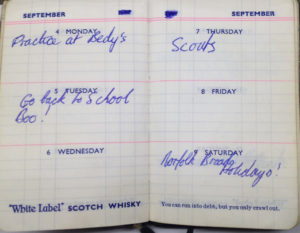(~3 minutes to read)

I came across my 1972† diary the other day. Interesting to see the things I was doing and making note of as a sixteen- to seventeen-year-old. For example, the entry for the 5th September is, “Back to school. Boo!” The following Saturday, it’s “Norfolk Broads—holidays!”
Aahhh—those were the days—when pupils could take a holiday during term-time without parents having to factor the fine into the budget.
The diary itself was probably a freebie given away with Dewar’s whisky—the bottom of each left-side page (or “verso”) has “White Label Scotch Whisky” printed on it. (Which prompts the question, “What’s a sixteen-year-old doing with a whisky freebie?” Besides, no one in my family home drank the stuff!)
Just as interesting as my scribblings were the little bon mots at the bottom of each recto. (“recto” is the opposite of “verso”. Oh… you didn’t care. Sorry.) Viewed through the ultra-sensitive, politically-correct magnifying glass of today, some of them are “out there”, but in 1972 they were just… amusing.
The oh-so-true “Lawyers get much more for divorcing people than clergymen do for marrying them” seems to have aged well, although I’m sure fewer people are married by a clergyman (or woman) these days, while lawyers are busier than ever untying knots.
Chuckle-worthy comments such as “The best thing to take when one is run down is the number of the car” and “If you want to be remembered, borrow something” also seem harmless still, although it’s surely only a matter of time before road accident victims object to making light of traumatic events and low-grade kleptomaniacs balk at being singled out for attention.
But the weightist “A detective states that fat men are hard to shadow, probably because they always look round” might prompt raised eyebrows among the amply-proportioned. Although the online OED doesn’t warn us, “fat” seems to be one of those words that we can no longer use in adjectival form.
And the sexist “The fellow who says that he understands women has never driven behind a woman driver” might get you beaten up with a handbag. The same goes for “Firemen dress and turn out in less than thirty seconds. There are no women firemen.”, except that the beating up might involve firefighting apparatus of some kind. This one also fails for the falsehood in the last part.
Or how about this: “The most curious thing in the world is a woman who isn’t.” It seems that the writer regarded curiosity as a flaw. (I don’t.) I assume the writer was confusing curiosity with nosiness. I also assume the writer was stereotyping. I also assume the writer had a death wish.
Interesting snippet for logophiles; in the first half of the last century, “curious” meant “…inquisitive. Often in bad sense: prying. (The current subjective sense.)”
So I guess the bon mot author was working from an old dictionary.
How do you feel about this one? “A miss with a mission often looks for a man with a mansion.” You may vote… now. (This reminds me of a similar phrase: “A mistress is what goes between a master and his mattress.” Funny in its day, but in these days of neo-Victorian moral value judgement, maybe not so much.)
These days, a significant majority of us use electronic diaries. And I have yet to see one of those that includes bon mots at the bottom of each page.
But I’m sure there’s an app for that.
† It was actually an unused 1967 diary that I use as a 1972 diary. After Feb 29, it worked as far as days of the week were concerned.

You could’ve used your 1967 diary again last year without the need to adjust for leap year. Easter would still be wrong though 🙂